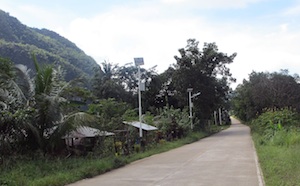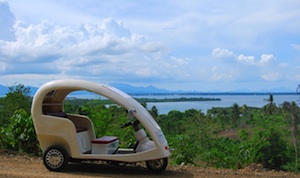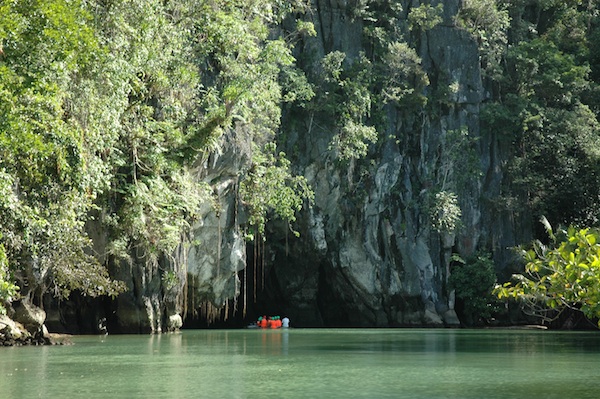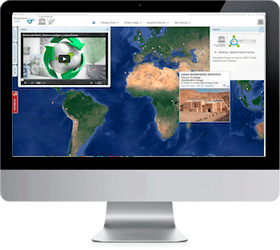Towards a Model City in Sustainable Development
The Palawan Biosphere Reserve is a cluster of islands composed of one long main island and smaller groups of islands around it. The 1,150,800 hectares of the biosphere reserve include the entire Province of Palawan Island, which is the westernmost province of the Philippines.
Puerto Princesa, capital of the Palawan province, is also known worldwide thanks to the underground river flowing close by, where the Puerto-Princesa Subterranean River National Park was created. The park was included in UNESCO’s World Heritage List in 1999.
Puerto Princesa is a multiawarded and pioneer city for environmental initiatives in the Philippines. ‘The City in a Forest’ is the designation that embraces the sustainable city strategy.
Solar and hydro power for a sustainable city
In June 2010 the City of Puerto Princesa formed a technical partnership with Optimal Power Solutions (OPS) in order to address the city’s power shortage, currently estimated at 5 to 10 MW.
An ongoing and significant issue has been the provision of sustainable energy for Puerto Princesa. At present, diesel-powered gensets provide a capacity of 30 MW of power to the inhabitants of Puerto Princesa. OPS and the City Council plan to design and implement renewable energy sources to generate additional power supply, reduce diesel fuel consumption and promote a viable and sustainable energy future. It is envisaged that new renewable sources of up to 10 MW capacity will be integrated over successive phases. This renewable capacity will prioritise the export of photovoltaic power into the grid to better support and lower use of the current diesel generators. Phase One of 1 MW capacity progressing up to 2MW, 5MW and finally 10 MW providing for future load growth of the City.
Furthermore, the Palawan Electric Cooperative (PALECO), the City Government of Puerto Princesa and WEnergy Global PteLtd have signed a Memorandum of Understanding (MoU) for the development of a hybrid electric power plant (1.5 MWp) to cover electricity supply of the Baranguy Cabayugan.
Hydro power is also part of the city’s energy strategy. The twin 3.4MW hydro-turbines provide at least 32 million kWh of electricity to the Palawan grid. Hydropower will replace the old and expensive to run NPC generators.
More energy-efficient homes
The rising urban population of Puerto Princesa has led to congestion in the city’s bay area, threatening the people’s quality of life and coastal reserve areas. Housing projects on the coast in Puerto Princesa City have been designed to reduce energy demand through increased natural light, improved ventilation, the cooling effect of the roofing material and strategically planting at least one fruit tree per household.
The potential annual carbon savings is estimated to be at least 72 tonnes for the 330 households. Other green features of the housing projects include the installation of a rainwater catchment facility that reduces the demand for water pumping, prohibiting the use of wood for the roof and interior frames and an appropriate disposal system for non-recyclables and non-biodegradables.
Greening public transport
The local government of Puerto Princesa has entered a partnership with the Institute for Climate and Sustainable Cities (iCSC), a non-governmental organization based in the Philippines working on “sustainable energy solutions and fair climate policy.” This partnership is under the Climate-Friendly Cities initiative of the iCSC, an initiative which combines waste management, renewable energy generation and sustainable transport programs for sustainable, climate-resilient city and community development.
Currently, Puerto Princesa has electric jeepneys (e-jeepneys) in the local government fleet and for private use, as well as electric tricycles (e-trikes), which are makeshift three-wheeled vehicles from motorcycles. The concept of e-jeepneys was developed by iCSC through a funding by Dutch foundation, Stichting DOEN. E-jeepneys were introduced in Puerto Princesa in 2009, with political cooperation playing a major role in the institutionalization of the electric vehicles as public transport. The power requirements of the electric feedjeeps and tricycles will be partly covered by the Waste-To-Energy project, jointly developed with the Institute of Climate and Sustainable Cities.
Reducing tourism’s carbon footprint
Puerto Princesa is currently among the top 10 major tourist destinations in the Philippines, and is striving to be the country’s number one tourist destination for eco-tourism.
Puerto Princesa has extended the concept of energy sustainability to the tourism sector, one example being its participation in the SWITCH-Asia ‘Zero Carbon Resorts’ project that seeks to enable tourism SMEs, such as hotels and resorts, to provide their energy services in an efficient, cost effective, and environmentally sound way.
The project applies the 3R strategy: Reduce-Replace-Redesign. The first step is to reduce the energy consumption in hotels and resorts, and the second step is to replace inefficient fossil-based devices with better, greener technologies. In the Redesign stage, a showcase ‘Zero Carbon Cottage’ will be built in Palawan, which will operate using solar- and biomass-based energy generation systems.
Lessons learned and replicability
Consistent with the vision of an environmentally sustainable city, Puerto Princesa will take a lead role in promoting environmental stewardship building mutual support and cooperation with cities in the Asia-Pacific region.
The ‘City in the Forest’ becomes the stage for the future of energy supply in The Philippines by enabling the mix in energy to contribute to stable prices for consumers and the mitigation of global warming.


















